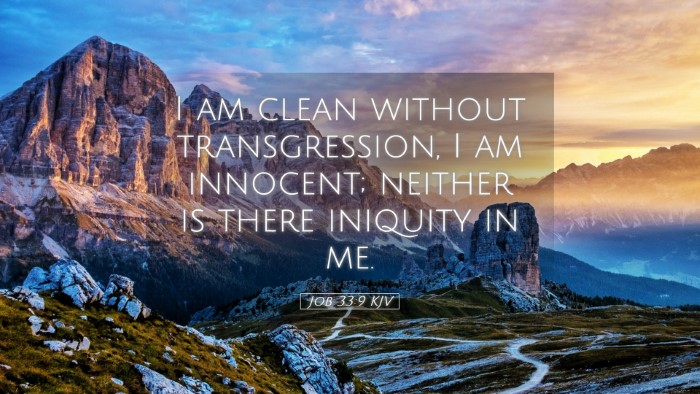Commentary on Job 33:9
Verse: "I am clean without transgression, I am innocent; neither is there iniquity in me."
This verse, spoken by Job, reflects a critical aspect of the discourse within the Book of Job. Job asserts his moral integrity and innocence, addressing the accusations and assumptions placed upon him by his friends. The verse serves as a pivotal point from which various reflections and theological interpretations arise, particularly regarding the nature of human suffering, divine justice, and the role of the Almighty in human affairs.
Exegesis of Job 33:9
Job’s declaration of cleanliness before God carries profound implications about self-assessment in the face of suffering. This assertion of innocence can be deeply understood through the lens of his experience.
Moral Integrity and Theological Context
According to Matthew Henry, Job's claim acts as a counterpoint to the simplistic theology that equates suffering with sin. His friends argued that suffering was a direct consequence of personal wrongdoing. Job’s insistence on his innocence highlights the complexity of divine justice and suffering.
Albert Barnes elaborates on this theme, suggesting that no matter how fervently Job declares his innocence, the faithful have often faced inexplicable calamities. Barnes notes that Job’s profound suffering raises important questions about the nature of God’s justice and the righteousness of man, as it contradicts the prevailing notion that the righteous will always be rewarded while the wicked suffer.
The Role of Human Suffering
Job’s exclamation points to a broader theological discourse concerning the reality of suffering among the righteous. Adam Clarke emphasizes that Job's assertion of innocence is not merely a defense of his character but a profound theological reflection on the unjust suffering of the good. He explains that there are times when God's people face trials not due to their sins but as part of a divine plan that transcends human understanding.
Analysis of Job's Reflection on Innocence
Job’s claim presents a dichotomy between human perception of equity and divine sovereignty. This section addresses various theological implications of Job's self-affirmation of purity.
The Complexity of Sin and Innocence
- Human Condition: The declaration of cleanliness highlights humanity's dual nature, struggling between the flesh's desires and the spirit's aspirations. The recognition of inherent sinfulness is echoed in New Testament theology, reminding believers of their ongoing need for grace.
- Defensive Posture: Job's defense can also be seen as a response to the accusations of his friends, illustrating the human tendency to justify oneself rather than seeking the truth of one's condition before God.
The Nature of God's Justice
The assertion of innocence further leads to a climactic understanding of God's justice. Here, Matthew Henry contemplates how God's justice does not conform to human expectations. Instead, it is a complex amalgamation of mercy, grace, and sovereign choice.
Pastoral Reflections
Job's statement in this verse serves as a poignant reminder of the struggle many believers face in their relationship with God when confronting suffering and injustice.
Lessons for Believers
- Encouragement in Suffering: Job’s experience provides comfort. Believers can take heart knowing that the trials they face do not always stem from personal failure.
- A Call to Humanity: This verse challenges us to reflect on our own declarations of innocence and righteousness, prompting self-introspection about our relationship with God and how we interpret suffering.
- A Message of Hope: Job’s ultimate vindication underscores the truth that God sees beyond our circumstances to our hearts, providing hope in the midst of trials.
Conclusion
The verse Job 33:9 opens a deep well of theological inquiry and reflection. As Job defends his purity amidst overwhelming suffering, it resonates profoundly with the complexities of faith, grace, and God's inscrutable plans. The insights gleaned from the commentaries of Matthew Henry, Albert Barnes, and Adam Clarke illustrate that while humans may understand suffering in a linear context, God's purposes are infinite and beyond human comprehension.
This synthesis of exegesis, interpretation, and pastoral care reveals that like Job, believers are invited to wrestle with their experiences of suffering, confess their moments of doubt, and yet, ultimately trust in God’s overarching sovereignty and divine justice.


